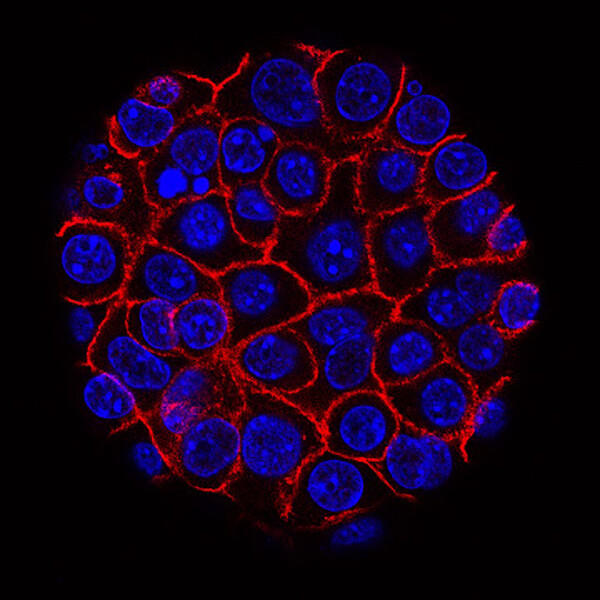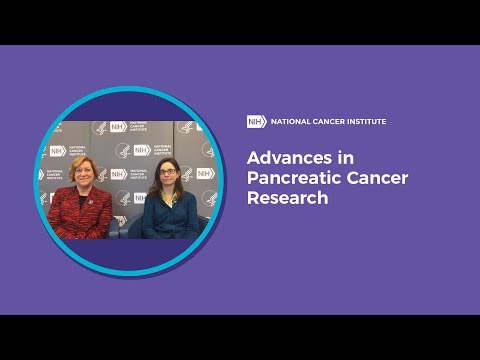
Advances in Pancreatic Cancer Research
NCI-funded researchers are working to advance our understanding of how to prevent, detect, and treat pancreatic cancer. The disease is very hard to detect early and currently there is no screening test available.
Pancreatic cancer is often diagnosed at an advanced stage, for people usually have no symptoms until the cancer has already spread to other organs.
This page highlights some of the latest research in pancreatic cancer, including clinical advances that may soon translate into improved care, NCI-supported programs that are fueling progress, and research findings from recent studies.
Pancreatic Cancer Treatment
Pancreatic cancer can be hard to treat surgically due to the location of the organ, and because the disease has often spread in the body by the time it is diagnosed.
Standard treatment for pancreatic cancer usually consists of surgery, chemotherapy, radiation, or combinations of each, depending on the cancer’s stage.
Beyond these standard treatments, NCI scientists continue to look for ways to treat pancreatic cancer more effectively. Researchers are looking at the potential of new drugs, ways to combine standard drugs, and new therapies to give to patients.
Testing Treatments for Early-Stage Pancreatic Cancer
Therapies for early-stage disease being tested in clinical trials right now are:
- New adjuvant chemotherapy drug combinations
Some of these postsurgical drug combinations are already known to extend the lives of patients with metastatic disease, but it's not clear if they are better at killing cancer cells left behind after surgery than standard treatments. - Neoadjuvant chemotherapy
This form of chemotherapy is given before surgery, with the goal of improving outcomes by shrinking the tumor before it’s removed. Presurgical chemotherapy also may help by killing cancer cells that have escaped from the tumor that would continue to grow as the patient recovers from surgery.
Testing Treatments for Advanced Pancreatic Cancer
New treatments for metastatic pancreatic cancer that are being investigated in clinical trials are:
- Stroma modifying drugs
The stroma is the dense tissue around a tumor that does not contain cancer cells. Pancreatic cancers have much denser stroma than most tumors. Agents that help break down this stroma may help more chemotherapy drugs reach cancer cells. PEGPH20 is an example of a stromal modifying agent being studied for patients with high-stroma tumors. This drug breaks down a protein that is thought to prevent chemotherapy drugs from getting into pancreatic cancers. - Platinum chemotherapy
Some patients have mutations in BRCA or other genes that prevent cells from repairing DNA damage. Research has shown that some patients with these genetic mutations are more sensitive to chemotherapy drugs containing platinum. In addition, use of another class of drugs called PARP inhibitors may be effective for these patients. - Immunotherapy
- Pembrolizumab. A rare group of people with pancreatic cancer have mutations in their tumor that cause high microsatellite instability (MSI). Pembrolizumab (Keytruda) is an immune checkpoint inhibitor approved for patients with pancreatic cancer that has high MSI. Immune checkpoint inhibitors work by helping the patient's own immune system fight their tumor. Patients should ask to have their tumors tested for high MSI.
- Immune checkpoint inhibitor combinations. Using one drug for immunotherapy treatment has not been effective for most people with pancreatic cancer. Therefore, researchers are combining several immunotherapies that can act on different parts of the immune system. The goal is to see if combining drugs that help "good" immune cells with those that fight "bad" immune cells can be more effective in treating the disease.
- Other combinations. Scientists are also studying combinations of immunotherapy with radiation therapy, stromal modifying agents, and other targeted drugs to determine if these could increase the effectiveness of immunotherapy.
Clinical Trials
Because of the complex nature of pancreatic cancer, many experts believe it’s important for all patients to join a clinical trial, even if they have early-stage disease. NCI funds and oversees both early- and late-phase clinical trials to develop new treatments and improve patient care. Trials are available for pancreatic cancer treatment.
NCI-Supported Research Programs
See a full list of pancreatic cancer research projects that NCI funded in FY 2017.
Many NCI-funded researchers at the NIH campus, and across the United States and world, are seeking ways to address pancreatic cancer more effectively. Some research is basic, exploring questions as diverse as the biological underpinnings of cancer and the social factors that affect cancer risk. And some is more clinical, seeking to translate this basic information into improved patient outcomes. The programs listed below are a small sampling of NCI’s research efforts in pancreatic cancer.
- The Pancreatic Cancer Detection Consortium (PCDC) develops and tests biomarkers to detect early stage pancreatic cancer and identify individuals at high risk for the disease.
- The Pancreatic Cancer Microenvironment Network (PaCMEN) is an NCI-funded consortium created to conduct both laboratory-based and clinical studies to improve therapeutic outcomes for patients with pancreatic cancer.
- The Pancreatic Specialized Programs of Research Excellence (Pancreatic SPOREs) are designed to quickly move basic scientific findings into clinical settings. The Pancreatic SPORE grants support new and diverse approaches to the prevention, early detection, diagnosis, and treatment of pancreatic cancer. Two of NCI's Gastrointestinal (GI) SPOREs also conduct research in pancreatic cancer.
- The Pancreatic Cancer Cohort Consortium consists of more than a dozen prospective epidemiologic cohort studies that investigate the causes and natural history of pancreatic cancer.
- The RAS Initiative looks to understand mutations in RAS genes to ultimately create effective, new therapies for RAS-related cancers. More than 90% of pancreatic cancers are caused by mutations in the RAS family of genes.
Pancreatic Cancer Research Results
The following are some of our latest news articles on pancreatic cancer research:
- Trial Highlights Complexities of Targeted Therapy for Pancreatic Cancer
- Hitting an Elusive Target in Pancreatic Cancer
- Chemotherapy Change Improves Pancreatic Cancer Outcomes
- FDA Approves New Treatment for Neuroendocrine Tumors
- Test Shows Promise for Pancreatic Cancer Early Detection
- Targeted Therapies Improve Survival for Patients with Rare Pancreatic Cancers
View the full list of Pancreatic Cancer Research Results and Study Updates.


































No hay comentarios:
Publicar un comentario